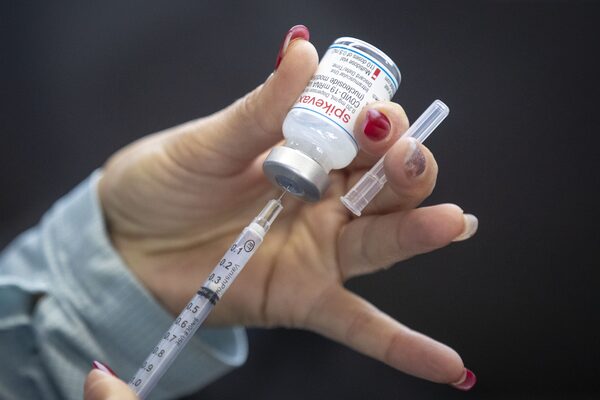
A person draws out a Moderna vaccine during a COVID-19 vaccine clinic at St. Lawrence College in Kingston, Ontario on January 2, 2022.Lars Hagberg/The Canadian Press
Moderna, Inc. will build a manufacturing plant in the Montreal area that will eventually pump out millions of shots for COVID-19 and other respiratory illnesses, along with future vaccines for whatever yet-to-emerge virus sparks the next pandemic.
The Massachusetts-based company is also expected to submit an application to Health Canada “shortly” for approval of its coronavirus vaccine in children younger than six, making Moderna the first company to seek Canadian approval to inoculate the youngest children against the pandemic virus.
Moderna chief executive officer Stéphane Bancel, Prime Minister Justin Trudeau, Quebec Premier François Legault and other politicians were expected to confirm the Quebec location of the plant at a news conference at McGill University on Friday morning.
Moderna and the federal government said last August that they had signed a memorandum of understanding that would culminate in the company making Canada the site of its first manufacturing plant outside the United States.
The company has since announced plans to build a plant in Australia on a similar timeline.
The Montreal and Toronto regions were both in the running to host Moderna’s Canadian facility, but Montreal Mayor Valérie Plante confirmed to reporters Thursday that her area had been chosen for the plant, which is expected to be completed by 2024.
When the pandemic hit, Moderna was a startup with limited production capacity and no approved products. It contracted with other vaccine-makers, namely Switzerland’s Lonza, to produce tens of millions of its mRNA shots, which, alongside a similar vaccine made by Pfizer-BioNTech, helped curb the death toll of the pandemic.
Messenger RNA is a single-stranded molecule that transmits instructions for cells to manufacture proteins. In the case of the mRNA vaccines for COVID-19, the shots were encoded with a message telling cells to make the spike protein that studs the coronavirus, coaxing the immune system to mount a defensive response it could repeat if the real virus ever showed up.
The shots were the first mRNA products to garner regulatory approval around the world.
Moderna is now working on updated versions of its COVID-19 vaccine aimed at a range of variants, including the super-contagious Omicron, which has blunted the ability of vaccines to prevent mild infections. The mRNA vaccines still substantially reduce the risk of severe illness and death, especially in those who have received three or more doses.
Moderna has other prospective mRNA shots in its pipeline, including an mRNA flu shot scheduled to enter a phase-three trial this fall, and an mRNA shot for respiratory syncytial virus, or RSV, for older adults that is already in phase three. RSV is a seasonal respiratory virus that is most dangerous to the very young and very old.
The “ultimate goal,” said Shehzad Iqbal, senior medical director of Moderna Canada, is to create a single annual shot that would be effective against multiple strains of COVID and influenza, and against RSV.
“We can create all these great vaccines, but if people don’t take them, it doesn’t help,” Dr. Iqbal said in an interview before the plant announcement. “If you can simplify the implementation side by combining them into one shot, then it just becomes a little bit easier to get better uptake.”
That goal is still a tall order. There is currently no approved vaccine for RSV, while making a universal flu vaccine has bedevilld researchers for decades.
Along with producing vaccines against infectious respiratory diseases, the other purpose of the Moderna plant would be supply Canada with emergency shots in the event of another pandemic.
By the time COVID-19 emerged, Canada had scant vaccine manufacturing capacity, leaving the country to rely on imported shots. The sector shrank over decades under multiple governments.
Canada did have a contract with the pharmaceutical giant GlaxoSmithKline to produce a pandemic flu vaccine at its plant in Quebec, but when the pandemic was caused by a coronavirus, not influenza, that contract was useless.
The mRNA platform, capable of being quickly recoded with the genetic sequence of a new virus, is more flexible than older ways of making vaccines.
The federal government has announced more than $1-billion in investments in the biomanufacturing sector since the pandemic began, including $200-million for Resilience Biotechnology to expand its facility in Mississauga; $126-million for a National Research Council plant to make Novavax’s COVID-19 shot; and $415-million for Sanofi Pasteur to build a new flu vaccine facility in the Greater Toronto Area.
In the near term, many Canadian parents will be wondering how soon they can get a shot into the arms of their preschoolers and toddlers. Right now, Health Canada has approved the Pfizer-BioNTech shot, sold under the brand name Comirnaty, for children as young as five, and Moderna’s SpikeVax for children as young as six.
Moderna on Thursday asked the U.S. Food and Drug Administration to authorize low doses of its two-shot regimen for children between the ages of six months and six years.
Pfizer-BioNTech, meanwhile, has delayed seeking approval of its shot in the youngest children while it studies offering a third dose after disappointing trial data showed two small doses weren’t strong enough to provide adequate protection.
With a report from The Canadian Press
Our Morning Update and Evening Update newsletters are written by Globe editors, giving you a concise summary of the day’s most important headlines. Sign up today.
 Kelly Grant
Kelly Grant